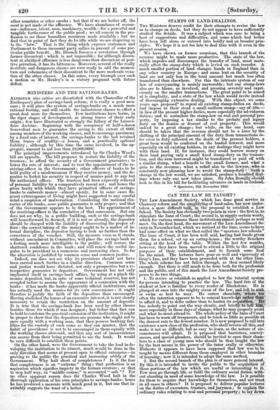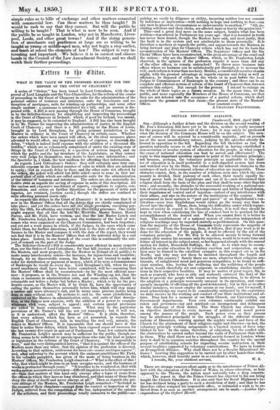CAN THE LAW BE TAUGHT?
Tim Law Amendment Society, which has done good service in Chancery reform and the OMplifying of land-sales, haS now under-, taken a more difficult ta*; in the proposal to establish a Law SchooL The Society has obviously two points in view : the firsas, to- stimulate the Inns of Court ; the second is, to supply certain wants, which for various reasons those institutions cannot perhaps so well' meet. On the first head, the movement of the Law Amendment So- ciety in November last, which we noticed at the time, seems to have had some effect on what we then called the "spurious law schools." The Inns of Court, it has been well said, having had funds given them for a school, set up an eating-house ; the worthy Benchers sitting at the head of the table. Within the last few months, however, they have been moved to attend a little to the original purposes of their establishment, and to furnish some food for the mind. The lectures have gone on well and vigorously at Gray's Inn, and they have been proceeded with at the other Inns. The whole scheme has not fallen through, as then seemed likely enough. But there is still much to be done both for the profession and the public, and of this much the Law Amendment Society pro- poses to do two things. 1. To revive or establish as applied to law the tutorial system for persons intending to practise the law. The hard fate of the student at law is familiar to every reader of Blackstone. He is plunged at once into the mighty ocean of the law, and left to sink or swim as best he may. He enters chambers, where too often the intention appears to be to conceal knowledge rather than to afford it, and to defer rather than to hasten its acquisition. He has nobody to point out the way clearly, and briefly to tell him, more especially in these days of change, what he may properly avoid and what he must attend to. The whole policy of the Inns of Court has been to warn off trespassers, and to teach as little as possible at the dearest rate to the fewest number. It is now proposed to call into existence a new class of the profession' who shall reverse all this, and - make it not as difficult, but as easy to learn, as the nature of cir- cumstances will admit. It is proposed that barristers convey- ancers, and special-pleaders, should be invited to open their cham- bers to a class of young men who should be thus taught the law by the best means in the power of the tutor orally or otherwise. Hitherto it appears to have been supposed that law was to be taught by means different from those employed in other branches of learning; now it is intended to adopt the same method. 2. But the second branch of the plan is of more general interest. By this it is intended to invite the public to the acquisition of those portions of the law which are useful or interesting to it. Few men go through life, or fulfil the ordinary social duties, with- out standing in need of some knowledge of the law. Is it possible for them to acquire that knowledge for themselves, and not trust in all cases to others ? It is proposed to deliver popular lectures on the duties of executors' trustees, and jurymen ; to explain the ordinary rules relating to real and personal property; to lay down
simple rules as to bills of exchange and other matters connected with commercial law. Can these matters be thus taught ? It would be rash to say that they cannot. But will the public be willing to be taught ? That is what is now to be seen. And if the public be so taught in London, why not in Manchester, Liver- pool, Leeds, and other great towns? And if the rising genera- tion of merchants and gentlemen at large are as willing to be taught as young or middle-aged men, why not begin a step earlier, and teach at school the elements of law ? The subject is very in- teresting and important. We believe it is in earnest and sincere hands in the Council of the Law Amendment Society, and we shall watch their further proceedings.

























 Previous page
Previous page